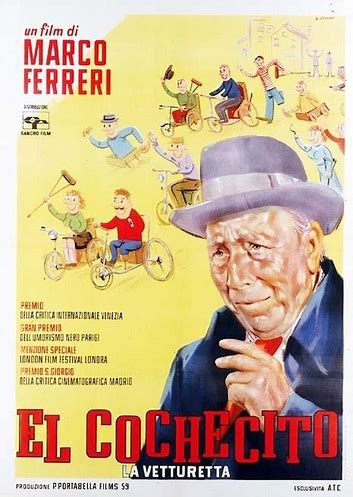Marco Ferreri’s El cochecito lives
up to its reputation, its perspective on the community of the differently-abled
still seeming radically matter-of-fact and quasi-aspirational. A retired
bureaucrat, Don Anselmo, visits an old friend who now gets around in a
motorized wheelchair, and who gives him a ride on it when Anselmo can’t find a
taxi; it leads to other get-togethers and contacts and diversions (presented in
enjoyably garrulous, lived-in manner) and to Anselmo desiring such an
item for himself, regardless that it’s beyond his means, and that
he doesn’t actually need it. The desire becomes a near-fixation, and yet
appears more rational than his family’s strident opposition to it (this aspect
of the film aligns well with modern Uber-aligned notions of choice and autonomy),
in particular as he actually wants to get out and experience people and places, an
ambition seemingly beyond the scope of his relatives’ closeted thinking. Threatened with
being committed to an asylum, Anselmo takes a desperate step to get what he
wants, his awareness of his transgression made clear in a startling, long-held
close-up, in which Ferreri temporarily seems to yield to the evocative powers
of his lead actor, Jose Isbert. The final scene (in the full original version
that is; the film was reportedly available for years only in bowdlerized form) allows
him a final taste of freedom, and although it’s clear that a severe reckoning
lies ahead, Anselmo’s final remark has a resigned lightness to it, suggesting
that from his hemmed-in point of view, his liberation, however brief, was worth
it at almost any logistical and moral price. The film allows occasional
glimpses of the later more expansive Ferreri (for example, Anselmo enjoys an
indulgent lunch that presages La Grande Bouffe), but on the whole
occupies its own stylistic and tonal space within his oeuvre, no less enjoyably
for that.


No comments:
Post a Comment